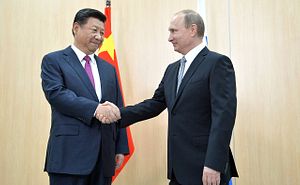The relationship between Russia and China has always been a complex one. Much of the Communist Party of China’s ideology, funding, and strategy in the early years came from Moscow. After 1949, the Soviet Union provided technology, investment, and expertise to the newly founded People’s Republic. But there were undercurrents of tension from the very start. Barely a decade in, the two suffered a spectacular falling out.
The USSR was forever looking for status and pre-eminence from what it regarded as its junior partner in the project of spreading global communism. China, however, was searching for hard pragmatic gains until the day when it could call the shots. Both sides were seeking very different ends through their sporadic partnership.
Military clashes in the late 1960s, and the disaster, in Chinese eyes, of the fall of the USSR in 1991 have only compounded this sense in Beijing that harmonious relations with their vast neighbor are more a matter of expediency than attachment to any deeper joint strategic vision. Moscow may have been the first foreign place that Xi Jinping visited when elevated to the Chinese presidency in early 2013, but he was only following precedent. Hu Jintao had done the same a decade earlier. The simple fact is that, unstable and poor or rich and confident, either kind of Russia arouses no particular enthusiasm in China.
What is indisputable is that the antagonistic relationship between Russia and the United States in the last few years has served China well. In the Middle East, Russia has taken the brunt, taking the lead in opposing U.S.-proposed actions in Syria and deploying its military while China, one of the core investors and actors in the region, sits on the sidelines. Putin’s Russia has harried and picked at U.S.-led military and security alliances in ways that suit China. And in the end, China is in the comfortable position of knowing that Russia’s economy is dependent on energy assets, of which the People’s Republic is the largest potential user. This is a powerful carrot to wave before China’s vast neighbor.
For all these reasons, Trump’s attitude toward Russia is just another on a long list of perplexing changes of direction his presidency signals for China. For Xi and his colleagues, their comfort zone is in dealing with a fractious Washington-Moscow relationship; one marked by warmth, smiles, and cooperation could be very disruptive.
Take one simple example — the Chinese-led Belt and Road Initiative. In the softest way possible, through investments and economic leverage, this project drives right into the heart of Russian interests in its core area of strategic interest, the Central Asian region. In that sense, the Belt and Road spells out how much more significant China is as a player in the region now than ever before, and how much space it is now staking out.
The outside world might not appreciate this. They look at a map and see a vast Russia spreading from the edge of Europe right over to the coast of Japan, but physical reality does not align with economic fact. Russia has a smaller economy than the U.K., France, Germany, or Italy. It ranks outside the top ten in the world. As of the end of 2016, the Russian economy was a hefty 15 times smaller than China’s — nearly smaller, in fact, than that of the single Chinese province of Guangdong — and growing smaller in comparison by the day. The Belt and Road Initiative is a subtle way of spelling this out. China is building an economic commonwealth in Russia’s backyard, and doing so in broad daylight.
In recent years, Xi and his fellow leaders have become adept at swamping Russia with their flattery. Xi’s speech there in early 2013 was a masterpiece in that regard, with a long list of great Russian writers and a peon to the country’s rich culture and status that was almost poetic. Underneath this however is a high awareness of just how far China under communism has come in contrast to the place that was the birthplace of the system. For the Chinese, the USSR simply abandoned its principles and spent the next decade or so declining and falling apart. The West might regard Putin with fear and mistrust; for China, this country more often merits pity.
The Art of War by Sunzi over 2,000 years ago embedded in the Chinese psyche an understanding of the political utility of concealment. Going for one thing while in fact saying you are aiming for another is a natural for most Chinese policy thinkers. The more they talk up the Russia relationship, the more one has to suspect things are not going well for Moscow. But having to now deal with an American president who seems willing to swamp more love on Putin than even Xi has upended this approach. Donald Trump seems to have intuitively worked out that there is one thing worse in diplomacy than hate from an opponent, at least for the Russians – and that is their ardent love. This perhaps explains the bemusement in Moscow at what to make of Trump and his advisors. For once, the United States has totally bewildered them.
China will have to work out soon enough just what to do with the pulses of warmth and friendly feeling that threaten to cross the world from Washington to Moscow. It knows that trilateralism in the past has always meant either a decent U.S.-China relationship, or a good U.S.-Russia one, but never both simultaneously. Forty-five years ago, America used a weak China to handle a stronger Russia. Now it might well be the tables are reversed, and a stronger China has to see Russia ally with the United States against it. One thing is for sure: Xi Jinping has to either put up with Trump’s dislike and enmity – or find ways of earning his love. And like Putin, he might find whatever the costs of the former, those of the latter are infinitely higher.
































